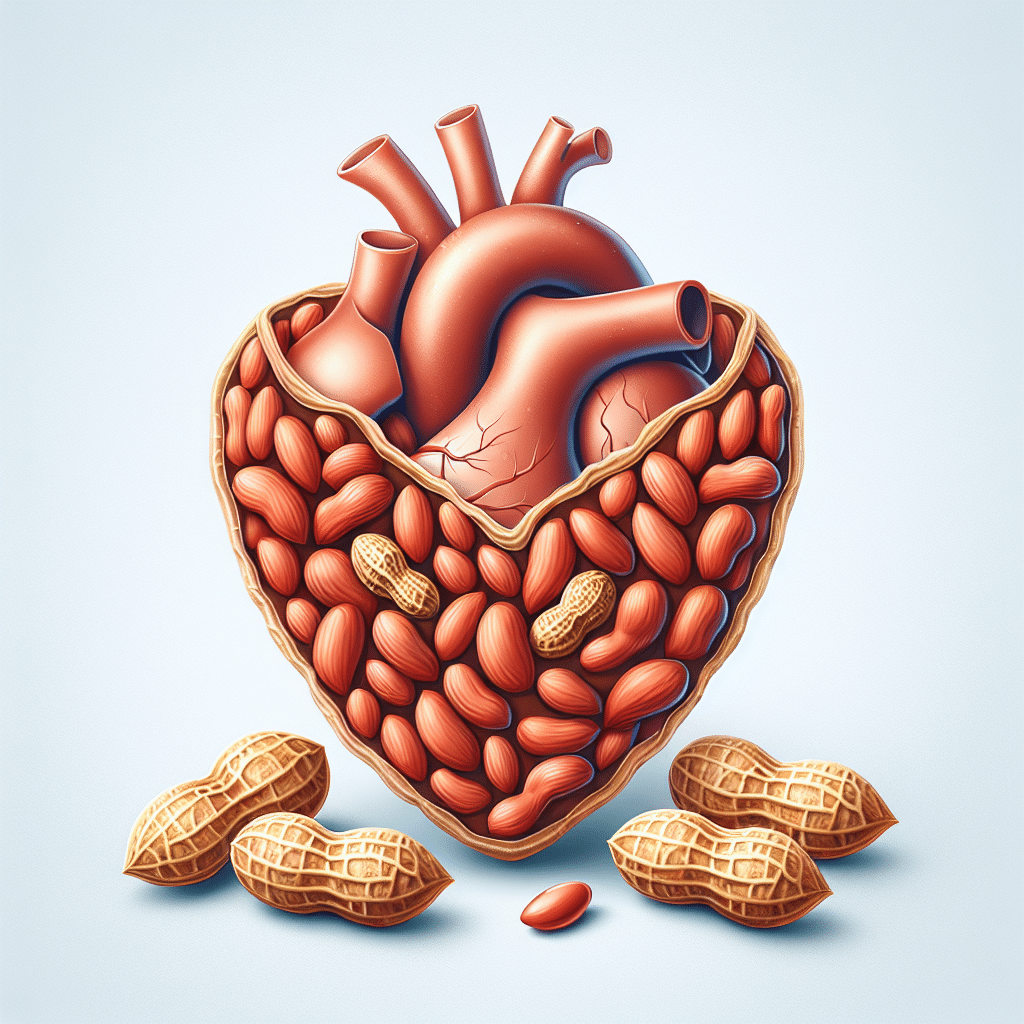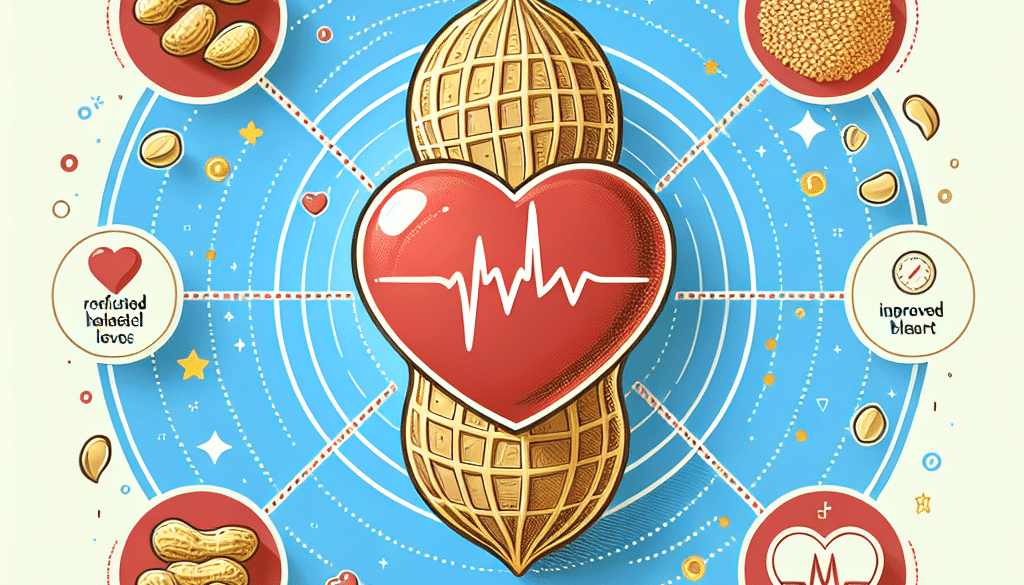Are Peanuts Good For Your Heart?
-
Table of Contents
- Peanuts and Heart Health: Uncovering the Nutritional Benefits
- The Nutritional Profile of Peanuts
- Scientific Research on Peanuts and Heart Health
- Case Studies and Examples
- How to Incorporate Peanuts into Your Diet
- Conclusion: Peanuts as a Heart-Healthy Choice
- Discover ETprotein’s Heart-Healthy Protein Products
Peanuts and Heart Health: Uncovering the Nutritional Benefits

When it comes to heart health, diet plays a crucial role in managing and preventing cardiovascular diseases. Among the myriad of foods that are touted for their heart-healthy properties, peanuts stand out as a nutritious snack that may offer significant benefits. This article delves into the question: Are peanuts good for your heart? We will explore the nutritional profile of peanuts, examine scientific research, and provide insights into how incorporating peanuts into your diet could impact your cardiovascular health.
The Nutritional Profile of Peanuts
Peanuts, despite their name, are not true nuts but legumes that grow underground. They are rich in various nutrients that are essential for maintaining a healthy heart. Here’s a breakdown of the key components:
- Healthy Fats: Peanuts are a good source of monounsaturated and polyunsaturated fats, which are known to be beneficial for heart health.
- Protein: They are also high in protein, which is important for muscle repair and growth.
- Fiber: Peanuts contain dietary fiber, which can help lower cholesterol levels and reduce the risk of heart disease.
- Vitamins and Minerals: They are rich in vitamins and minerals such as vitamin E, magnesium, and potassium, which support heart function and overall health.
- Antioxidants: Peanuts contain antioxidants, including resveratrol, which has been linked to heart health.
Scientific Research on Peanuts and Heart Health
Several studies have investigated the relationship between peanut consumption and heart health. Here are some of the findings:
- A study published in the Journal of the American College of Nutrition found that regular peanut consumption was associated with a lower risk of cardiovascular and coronary heart disease.
- Research in the Journal of Nutrition suggests that the high content of monounsaturated fats in peanuts can lead to reductions in levels of bad cholesterol (LDL), thereby reducing the risk of heart disease.
- According to a study in the British Journal of Nutrition, the bioactive compounds in peanuts, such as resveratrol, flavonoids, and phenolic acids, may have cardioprotective effects.
These studies indicate that peanuts could be a heart-healthy addition to your diet when consumed in moderation as part of a balanced diet.
Case Studies and Examples
Real-world examples further illustrate the potential benefits of peanuts for heart health:
- In a case study, individuals who replaced a portion of their saturated fat intake with unsaturated fats from peanuts saw improvements in their cholesterol levels and a reduced risk of heart disease.
- Population studies, such as those conducted in the United States and China, have shown that communities with higher peanut consumption tend to have lower rates of heart disease.
How to Incorporate Peanuts into Your Diet
Adding peanuts to your diet can be simple and delicious. Here are some ideas:
- Snack on a handful of unsalted peanuts instead of chips or processed snacks.
- Include peanut butter in your breakfast by spreading it on whole-grain toast or adding it to oatmeal.
- Use chopped peanuts as a topping for salads or stir-fries to add crunch and nutrition.
- Make a healthy trail mix with peanuts, dried fruit, and dark chocolate for a heart-healthy treat.
It’s important to note that while peanuts can be beneficial for heart health, they should be consumed in moderation due to their high calorie content. Opt for natural, unsalted peanuts or peanut butter without added sugars and fats to maximize health benefits.
Conclusion: Peanuts as a Heart-Healthy Choice
In conclusion, the evidence suggests that peanuts can indeed be good for your heart. Their rich nutritional profile, including healthy fats, protein, fiber, vitamins, minerals, and antioxidants, contributes to cardiovascular health. Scientific research supports the notion that moderate peanut consumption can lower the risk of heart disease by improving cholesterol levels and providing cardioprotective nutrients.
As with any dietary choice, balance and moderation are key. Peanuts should be part of a varied and balanced diet that includes a wide range of nutrients. For those looking to improve their heart health, incorporating peanuts could be a tasty and nutritious way to make a positive impact.
Discover ETprotein’s Heart-Healthy Protein Products
If you’re interested in enhancing your diet with high-quality protein sources, consider ETprotein’s range of products. Their peanut protein is an excellent choice for those looking to support their heart health with a plant-based protein option. ETprotein’s commitment to non-GMO, allergen-free, and high-purity ingredients ensures that you’re getting the best for your health.
Whether you’re formulating sports nutrition, weight management, or general wellness products, ETprotein offers a variety of protein powders and supplements to meet your needs. Their expertise in the industry makes them a trusted partner for businesses and consumers alike.
To explore ETprotein’s offerings and learn how their products can benefit your heart health, contact them at sales(at)ETprotein.com today.
About ETprotein:
ETprotein, a reputable protein and L-(+)-Ergothioneine (EGT) Chinese factory manufacturer and supplier, is renowned for producing, stocking, exporting, and delivering the highest quality organic bulk vegan proteins and L-(+)-Ergothioneine. They include Organic rice protein, clear rice protein, pea protein, clear pea protein, watermelon seed protein, pumpkin seed protein, sunflower seed protein, mung bean protein, peanut protein, and L-(+)-Ergothioneine EGT Pharmaceutical grade, L-(+)-Ergothioneine EGT food grade, L-(+)-Ergothioneine EGT cosmetic grade, L-(+)-Ergothioneine EGT reference grade and L-(+)-Ergothioneine EGT standard. Their offerings, characterized by a neutral taste, non-GMO, allergen-free attributes, with L-(+)-Ergothioneine purity over 98%, 99%, cater to a diverse range of industries. They serve nutraceutical, pharmaceutical, cosmeceutical, veterinary, as well as food and beverage finished product distributors, traders, and manufacturers across Europe, USA, Canada, Australia, Thailand, Japan, Korea, Brazil, and Chile, among others.
ETprotein specialization includes exporting and delivering tailor-made protein powder and finished nutritional supplements. Their extensive product range covers sectors like Food and Beverage, Sports Nutrition, Weight Management, Dietary Supplements, Health and Wellness Products, and Infant Formula, ensuring comprehensive solutions to meet all your protein needs.
As a trusted company by leading global food and beverage brands and Fortune 500 companies, ETprotein reinforces China’s reputation in the global arena. For more information or to sample their products, please contact them and email sales(at)ETprotein.com today.














